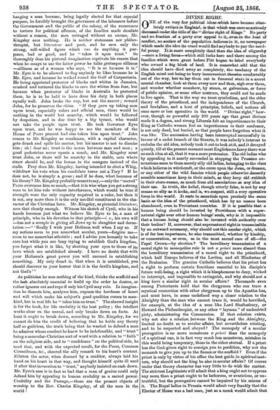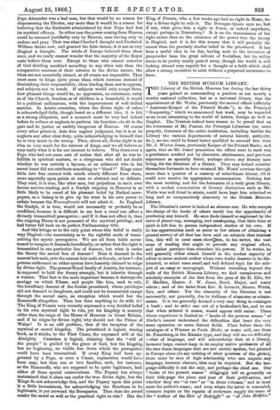-DIVANS -ALGAL
CANE of the very law political ideas whielt have become abao-
lutely extinct in England, is that which was once tio seriously discuaseduhdertlielitlerof the 44 diviate-right of Kings." No party and no fraction -of ,a /tarty ever appeal to itaevenain-the heat of conflict, no section of the :population believesin lit, no newspaper which made the idea its creed would find anybody.to pay the need- ful penny. It more completely dead than the idea of oligarchy —once A living force—which still lurks here and there among the families:which were great before Pitt began to label everybody who owned a _big block of land. It is somewhat odd that the idea should have died away so completely, the 'tendency of -the English-mind• not being,to bury ineonaenient' theories comfortably out of the -way, but-to lay them out in funereal state in a-secret mental chamber, look-at them every now and then, sigh over-them, and wonder -whether somehow, by steam, or galvanism, or force of public opinion, or some other nostrum, they could not be made to live again. That is the way we- treat symbolism, and the elder theory of the priesthood, and the independence of the ,Church, and feudalism, and a host Of ptiuciples, beliefs, and notions all once more or less operative in the world. "Divine right," how- ever, though so powerful only 200 years ago that _great divines made it a dogma, and strong Liberals felt an inapertineeee to their King as Catholic women feel an impertinence to their confessor, is not only dead, but buried, so that people have hagotten what it was like. The succession having been interrupted successfully in favour of a cadet branch of, the Stuarts, it was nobody's interest to embalm the old idea, nobody took it outtolook atit, admit decayed , quietly, till at the, present moment most Englislimenfancythere was n.o.auch idetaat all,that it wasa mere pretension. The old ladies who by appealing tnit nearly. succeeded in stopping the Prussian an- nexations seem to them merely silly old ladies, beloagiag to the class which helievesin witchcraft, or the,curse upon the Jews, or dreams, or any other of the wild:fancies which people otherwise decently sensible sometimes keep in their minds, as they keep old "rubbish in the store-rooms, as much from old associations as any idea of their use. -In truth, the belief, though utterly false, is not by any means so stilly as it looks, and ifS, .we suspect, stilla very operative force in-the-world. It:rests in.essentials upon precisely the same basis as the idea of the priesthood, which has by no means been abandoned, even in Protestant countries. If it is possible that a human being should be invested by Providence with a super- naturalright over other human beings' souls, why is it impossible that a human .being should also be invested with authority over their bodies? If, moreover, that supernatural right is transmissible by an outward ceremony, wily- should net this secular right, -which is of far less importance, be also transmitted, whether by kinship, or consecration, er even, as -in the most sacred case of all--the Papal Crownlay election? The hereditary transmission of a moral right to monopolize rule is not a priori more absurd-than the hereditary transmission of a moral -right -to the priesthood, which half Europe believes of the Leaites, and all Hindostan of the Brahmins. The genuine Catholic believes that his priest has a right to perform certain -functions essential to his disciple's future well-being, a right which it is-blasphemous- to deny, wicked to interrupt, and impossible to extinguish, and why should-not a" king have a similar right in secular affairs ? Thousands - even among Protestants hold that the clergyman who can trace a mystical connection with other clergymen op to the Apostles has, and must have, in some undefined way a closer relation to the Almighty than the man who cannot trace it, would be horrified, for example, at the idea of a man like lord Shaftesbury, or Howard the Philanthropist, or any other " layman" of undoubted piety, administering the Communion. If that relation exists, why not also a relation, between the Tang and the Almighty, limited no doubt as to secular affairs, but nevertheless existing, and to be respected and obeyed ? The monopoly of a secular prerogative is no more monstrous a priori than the monopoly of a spiritual one, is in fact very much less monstrous, mistakes in this world being temporary, those in the other eternal. If a priest has the God-given right to consign you to perdition, why not the monarch to give you up to the flames or the scaffold ? Even if the priest is only by virtue of his office the beat guide in spiritual mat- ters, why should not the king be also in secular affairs? Of course under that theory character has very little to do with the matter. The strictest Legitimists will admit that a king ought not to oppress any more than a priest ought tobe lecherous, or avaricious, pr un- truthful, but the prerogative cannot be impaired by his .misuse of it. 'The Royal ladies in Prussia would admit very frankly that the Elector of Meese was a bad man, just as a monk would admit that Pope Alexander-was a bad-man, but-that would-be no reason for dispossessing the Elector, any morel-hart it would be a reason for believing that the Eucharist administered by that Pope had lost its mystical efficacy. In either case the power coming from Heaven could be resumed justifiably only by Heaven, man having only to endure and pray. That was what Charles I. thought and Frederick William thinks now, and granted the 'false datum, it is not so very illogical a -thought. The whole of Europe believed those ideas once, and we really cannot wonder that the majority of the Royal caste believe -them now. Except to those who cannot conceive Of God dividing mankind according to any other rale than the comparative nearness of their natures to the divine nature, the ideas are not-essentially absurd, at all events not impossible. They must seem to kings quite pious ideas, which increase instead of diminishing their responsibility, ideas binding them not to oppress, and subjects not 'to revolt. If subjects would only accept them, how pleasant things would be, no oppression, no resistance, unity as of the Church, freedom as of children in a household, it would be a political millennium, -with the improvement of well drilled sentries. In Asiatic countries, where the divine right of rulers is adknowledged fully, though based on a different idea, it is felt as a strong obligation, and a monarch must 'be very bad indeed before he refuses or neglects to perform his function—to sit in the gate and do justice as earthly vicegerent of Heaven. Of course -every other prince in Asia does neglect judgment, but it is as he neglects any other clear duty, quite acknowledging to himself that he is very much in the wrong. Then, above all, divine right is an idea so very much for the interest of kings, and we all believe so very easily what it is for our interest to believe. Was there ever a Pope who had not some sort of notion that after all he was in- fallible in spiritual matters, or a clergyman who did not doubt whether he was entirely a 'layman, or an aristocrat who in his secret heart did not attribute something to " blood?" Kings come little into free contact with minds utterly different from them, more especially upon points at once so abstract and so delicate. They read, it is true, like other men, but prejudices in one's own favour survive reading, and a Guelph reigning in Hanover is as little likely to be cured of his pleasant belief by Radical news- papers, as a bishop is to give up -his trust in his own power to ordein because the Nonconformist will not admit'it. In England the Guelph, it is true, would not necessarily or probably be so conlident,because it is difficult to see how a creed can affect a divinely transmitted-prerogative ; and If it does not affect it, then the reigning House is not possessed of the mystical privilege, and had 'better fail book on its perfect Parliamentary title. And this brings us to the only point where this belief is really very illogical—the uncertainty as to the rightful mode of trans- _miffing the mystic prerogative. 'We are all 'from habit accus- tomed to imagine it descendsliereditarily, or rather that the right is 'transmitted in one particular line of descent, but what is under the theory the sacred -line of descent? Does it descend to the nearestbeir male, orto the nearest heir male or female, or how ?—for persons enthroned on either system have honestly claimed to reign 1?y divine right. The preseneRoyal family of Austria, for instance, is supposed 'to 'hold the theory strongly, but it inherits through at woman, That fact is the more important "because it destroys the Analogy on Which Filmer, and people 'like him, used to rely, the hereditary descent of the: eviish priesthood, whose privileges -did not descend to daughters, and could not be transmitted except through the sacred caste, an exception which would bar -the Romano& altogether. Then has 'time anything to do with it? The King of Prussia very recently expressed a very decided belief in his own mystical right to ride, yet his kingship is scarcely -older than the reign of the House cif 'Hanover in Great 'Britain, land if he reigns by- divine right'',' why Should not the Prince of -Wales'? It is an odd problem, that of the inception of the mystical or sacred 'kingship. 'The priesthood is logical, tracing back, as it thinlis, to 'the Tint Cause, the expressed will of the Almighty. Cmsarisin is logical, clainiing that the "will of the people' is guided by the grace of God, but the kingship has no beginning, no visible line down which the prerogative -could 'have been transmitted. 'If every King had been ap- pointed 'by a Pope, or even a -Cmsar, explanation would have been easy, but then one or two families, such, for 'instance, as the Ropaanoffs, who are supposed to be quite legitimate, lack either of these special consecrations. The Papacy has always 'maintained that it alone can confer the true divine right, but 'the "Kings do not acknowledge this, and 'the 'Papacy upon this -point is a little "inconsistent, for acknoWledging the 'Bourbons to be 'legitimate, it yet crowned the Monapartes. Then does the award confer the moral as well as the practical right to rule ? Has the Xing of Prussia, who a few weeks ago had no right in Hesse, to- day a divine right to rule it. The Dowager-Queen says no, but if not, what gives him a right in Posen, or indeed anywhere, except perhaps in Nuremberg? It is on the transmission of the right rather than on the existence of the power that the theory is illogical, and it is for this reason 'that it will probably die sooner than the precisely similar belief in the priesthood. It has been a useful idea in its day, having next to the invention of gunpowder been the great solvent of feudalism, but its utility seems to be pretty nearly passed away, though the -world is still looking abroad very eagerly for a thought or a faith which shall allow a strong executive to exist without a perpetual recurrence to force.































 Previous page
Previous page